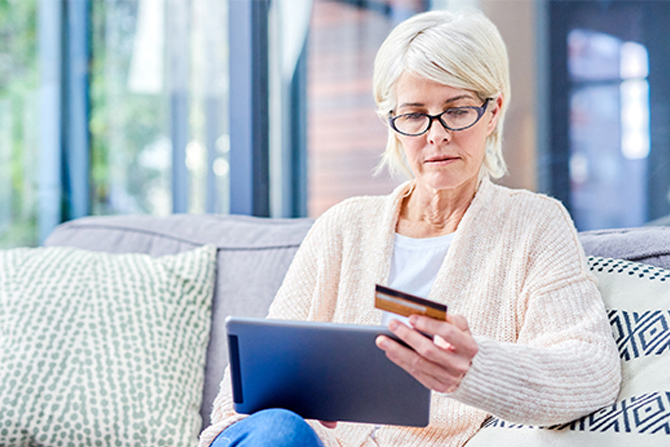
As the world has adapted to “doing more from home,” the volume of purchases being made entirely online has skyrocketed. Unfortunately, so have online shopping scams. Whether you’re shopping for holiday gifts or making a big purchase, like a pet or a car, there are always people looking to take advantage of you—and your wallet.
“Scammers go where they feel they can best take advantage of people. Not surprisingly, scams perpetrated online through websites and social media apps were the riskiest contact methods for all age groups in 2020 – including both young adults as well as older adults.”
– Melissa Lanning Trumpower, executive director of the Better Business Bureau® (BBB) Institute for Marketplace Trust1
While online shopping scams are always evolving, there are a few key telltale signs that you should take your money elsewhere.
It might be a scam if…
- It’s too good to be true – Sorry to burst your bubble, but that outrageous deal on the game system that’s sold out everywhere is probably not real. Scams often rely on unbelievable deals and scarcity of product to prey on people’s fears.
- There’s pressure to buy right away – If a seller is pushing you to make a decision without thinking it over, or worse is outright telling you to avoid contacting anyone before making your decision, run the other way.
- The seller acts suspiciously – If you’re buying something like a pet or a car, and the seller refuses to meet in-person or let you see the item before money is exchanged, you’re dealing with a scam. The same can go for websites that just seem a little off. Scammers are known to mimic promotional emails and websites from well-known brands. Always double-check that the URL is spelled correctly and that it begins with “https,” which denotes a secure address and adds a layer of protection. Utilize a VPN in addition to the https for added protection.
- The seller wants an immediate form of payment – Cash is king in the land of scams. But not the paper money you’re thinking of. If a seller asks you to send money using a mobile payment app or wire transfer, or they ask you to pay in prepaid debit cards or gift cards, there’s no way to get your money back if the deal turns out to be a dud.
None of this should deter you from trying to find the best bargain from the comfort and convenience of your home. Remember these six tips to shop with confidence.
How to protect yourself from scams:
- Use a credit card instead of a debit card – We already discussed the dangers of cash-only and cash-like forms of immediate payment. Debit cards can also fall into this category because they are directly tied to your bank account. Using a credit card is your best bet for security and overall purchase protection.
- Don’t click on links or attachments in unsolicited emails or text messages – If you’re contacted by a seller or even a website you don’t know, just delete it and move on. It could be an attempt to download malware on your device that allows scammers to steal your personal information. It’s not worth the risk.
- Don’t give out your personal information to people you meet online – This applies to sellers on the usual marketplace sites, like Craigslist, Facebook, and NextDoor, as well as people you meet on dating apps, social media, and gaming sites. Think of it as “stranger danger” in the digital age.
- Use more than one password across your accounts – This can protect you from website-based scams that attempt to steal or leverage already stolen personal information. It’s a good habit, in general, to regularly update and change your passwords to all your online accounts.
- Stay alert to evolving scams – The BBB is a great resource for this and will deliver Scam Alerts directly to your inbox. You can sign up online today. Additionally, AARP Fraud Watch Network provides helpful and free resources.
- When in doubt, Google it! – If you aren’t sure whether to trust an offer, a seller, or a website, Google the name along with words like “fraud” or “scam.” If others have fallen prey, you’ll likely find out quickly.
Are you reading this post thinking, “Gee, I wish I’d known all this when…”? Well, it may not be too late to recoup your money or at the very least, help protect others. If you’ve sent money to a scammer, report the scam to your financial institution first. Next, report it to the Federal Trade Commission, who works to investigate and shut down scams, and to the BBB Scam Tracker, so others will be alerted to avoid it.
Keeping you safe is part of what we do.
Allegacy is here to ensure your financial wellbeing is protected. We offer Financial Workshops on Staying Safe Online. You can receive text Alerts + Notifications through our Mobile Banking app for real-time updates on transactions involving your accounts. And best of all, our Allegacy Visa® Check Card offers automatic fraud detection with zero liability for unauthorized transactions.2 Here’s to safe and happy online shopping!
1. https://www.bbb.org/article/news-releases/23820-adults-18-24-report-highest-scam-risk-in-2020
2. Zero Liability Fraud Protection does not apply to ATM transactions or PIN transactions not processed by Visa, and certain commercial card transactions. Notify Allegacy immediately of any unauthorized use. For specific restrictions, limitations and other details regarding unauthorized use, see your account agreement.
Views expressed do not constitute legal advice. The information contained herein is for general guidance of matter only and not for the purpose of providing legal advice. Restrictions apply.
Contact your local police department to file a report if you have been scammed.



